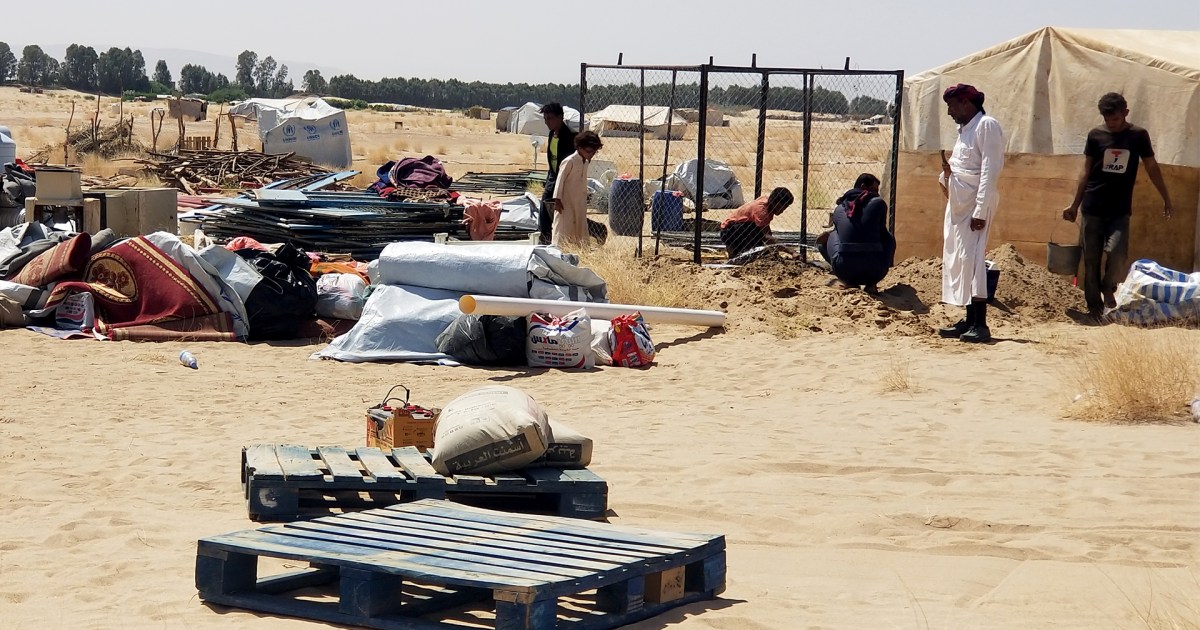Another Ramadan comes to Taiman's student while he is far from his home, and the holy month no longer bears the same feelings that the twenty-year-old lost 7 years ago.
Tuaman and his family were forced to flee from their home in the village of Al-Zour in the Serwah district, west of Ma'rib Governorate, following the expansion of battles between Houthi forces and pro-government forces in early 2015.
The war, which is entering its eighth year, has displaced 4.2 million people, according to the latest statistics of the United Nations High Commissioner for Refugees (UNHCR) last January.
Despite repeated calls to provide support to the displaced in Yemen, UNHCR said that it has received only 9% of the funding needed to assist displaced families in Yemen this year, which may portend a humanitarian crisis for the thousands who depend on humanitarian aid.
alternate joy
Toaman is doing his best to create alternatives that will forget with his family the moments of distress they live in, in light of their lack of joy that Ramadan brought, and he told Al Jazeera Net that he lacks the spirit of intimacy, interdependence and cooperation between the people in his village and among his family.
He added, "Ramadan had a different festive atmosphere. We have been preparing for it since the middle of Sha'ban, and we start it by competing in decorating homes and neighborhoods, and arranging dhikr sessions in mosques, but we miss all of that. The advent of Ramadan has become a burden, especially as we fast during the day in the camps in the scorching desert heat."
Toaman and his family members bought timber and plastic sheeting to build other tents for his family, which would ensure that the cold desert air conditioner did not leak.
But the thing that pleased Tuaman and the other displaced people in Naqi'a camp, is that for the first time in 7 years they will spend Ramadan nights with the electricity that the local authorities have promised to provide to the camp.
"We record the electric current from one of the stations, and God willing, the electricity will continue until the end of the month of Ramadan," he says.
Al-Naqia camp is one of the main camps in Ma’rib governorate, which contains 195 camps, inhabited by about 243,000 displaced people, who are part of the two million and 200 thousand displaced people in the governorate, according to what the Executive Unit of Displaced Persons Camps of the Yemeni government says.
Tuaman does not like to remember his home and village and the details of Ramadan there, and says, "We no longer return (we don't think we will return to) the country (our villages), the war will remain (it will remain) like this and will not stop."
The Houthi group has controlled Serwah district since 2015 and represents a major supply route to Sanaa, which made it a war zone that prevented residents from returning to their homes.
Ramadan among the family
With the advent of the holy month, Ali Al-Dhafri resists the moments of nostalgia, as he spends the first month of Ramadan away from his family, who remains in the Abdiya district.
On October 15, the armed Houthi movement took control of the center of the Abdiya district, south of Ma'rib governorate, after besieging it for more than 3 weeks, and launched a campaign of raids and arrests, forcing dozens of people to flee, including Al-Dhafri.
He tells Al Jazeera Net, in an exhausted tone, that the advent of the month of Ramadan gave him great sadness due to the absence of his family, whom he left behind in the village, while the state of displacement and homelessness exacerbated his suffering, especially in the absence of services and high prices.
Al-Dhafri himself wishes to spend the month of Ramadan in his home and among his children, and says, "Ramadan had a special spirituality, represented in dhikr councils, meetings between tribe members, group breakfasts, and family gatherings on Ramadan nights."
"The war came and we were displaced, and since then we have not met our children," he added.
Al-Dhafri fears that his suffering will be prolonged, like the rest of the displaced who have become homeless since the outbreak of the war.
The Saudi capital, Riyadh, witnessed Yemeni-Yemeni consultations organized by the General Secretariat of the Gulf Cooperation Council, in the presence of the UN and US envoys to Yemen, and the Houthi group, which sees it as taking place in a "non-neutral" country, was absent.
the game is up
In the city of Seiyun in the Hadhramaut governorate, in eastern Yemen, Abdul Qader Haider is trying to adapt to the desert city, despite arriving there 6 years ago, fleeing the Houthis' pursuit as a leader in the Islah party.
He tells Al Jazeera Net that a state of depression dominates him when the month of Ramadan comes and he is far from his large family, as he used to spend the days of the holy month among his large family, which often gathered in his father's house.
He added, "Our house was a destination for fasting people who wanted to break their fast, and happiness used to fill our house and neighborhood, but now we are displaced in a strange city."

